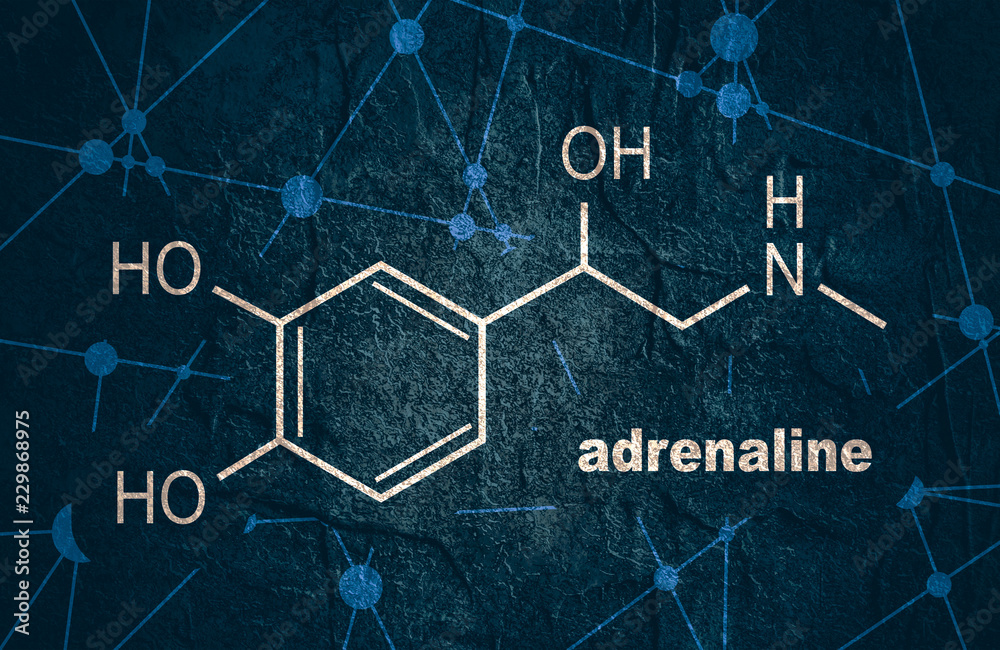
Key facts
- Adrenaline is a hormone that your body naturally releases from your adrenal gland.
- Adrenaline causes changes in your body that help you to act in a sudden stressful situation — also known as a ‘fight or flight response’.
- Adrenaline is also used sometimes as a medicine, for example, an adrenaline injection in severe allergic reactions (anaphylaxis).
- If you or someone else is having symptoms of severe allergy (anaphylaxis), use an adrenaline (epinephrine) autoinjector first — then call triple-zero (000) and ask for an ambulance.
What is adrenaline?
Adrenaline is a hormone that helps you react very quickly if you are faced with an exciting, stressful or dangerous situation. This is known as the ‘fight-or-flight response’. In this type of situation, your brain sends messages to your adrenal glands (located just above the kidneys) to start releasing the hormone into the blood. You will feel the effects of the adrenaline within 2 or 3 minutes.
Adrenaline is also a medication used to treat a severe allergic reaction (anaphylaxis) in an emergency. It may also be used during cardiac arrest, croup and asthma when other treatments are not effective.
When the situation becomes calmer, the glands stop producing adrenaline. You might still feel the effects of it though, for up to 1 hour.
The dose can be given using an autoinjector, and you can read about how to use an adrenaline autoinjector here. If someone is having an anaphylaxis, give the adrenaline first then call triple zero (000) and ask for an ambulance.
What is the role of adrenaline?
Adrenaline makes your heart beat faster and your lungs breathe more efficiently. It causes the blood vessels to send more blood to the brain and muscles, increases your blood pressure, makes your brain more alert, and raises sugar levels in the blood to give you energy. Your pupils grow larger and you sweat.
When you have a lot of adrenaline in your blood, you don’t feel as much pain, so you can keep running or fighting, even if you are injured. It makes you stronger and allows you to perform better.
The body also produces a similar chemical called noradrenaline (or norepinephrine). It is made in the nervous system and released into the blood continuously. Unlike adrenaline, which affects several parts of the body, noradrenaline’s main role is to control blood pressure.
Noradrenaline is also used to treat people whose hearts have stopped beating (cardiac arrest). It can be used along with other medicines to control pain before or during surgery.
Is having too much or too little adrenaline a problem?
If you have too much adrenaline, it can lead to symptoms including:
- dizziness
- changes to your vision
- a quick heartbeat
- feeling irritable and jittery
- insomnia
Being stressed can lead to someone having too much adrenaline. Some rare medical conditions, such as a tumour on the adrenal glands, can also cause someone to have too much adrenaline.
Over time, high levels of adrenaline can increase your risk of a heart attack or stroke, and cause heart palpitations, high blood pressure, anxiety and weight loss.
Having too little adrenaline is very rare, but people who don’t have enough of the hormone cannot react properly to stressful situations.
How can I adjust my adrenaline levels?
If you are stressed, you can lower the adrenaline level in your body by:
- breathing deeply
- meditating
- practising yoga or tai chi
It also helps to eat a healthy diet, exercise regularly and limit caffeine and alcohol.
Adrenaline injections
An adrenaline injection, such as EpiPen or Adrenaline Mylan, is used as a treatment for a severe allergic reaction (anaphylaxis). It works by quickly reducing swelling in the throat, opening up the airways and preventing the blood pressure from falling too low. It is sometimes used for people who have serious breathing problems including asthma with associated anaphylaxis, croup and cardiac arrest.
The adrenaline is injected into the large muscle in the thigh and can save someone’s life. If in doubt, always use the adrenaline autoinjector first, then use asthma reliever medicine and call triple zero (000) for an ambulance.
There are 2 doses of adrenaline autoinjector available in Australia and New Zealand:
- 0.3mg adrenaline, for adults and children over 20kg
- 0.15mg adrenaline, for children 7.5 to 20kg
For more information on adrenaline autoinjectors, including videos on how to use them, visit the ASCIA website.
If you are at risk of anaphylaxis, it is a good idea to discuss an ‘anaphylaxis action plan’ with your doctor or pharmacist.

